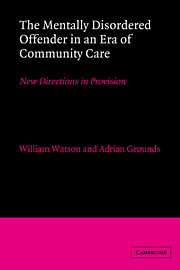Book contents
- Frontmatter
- Contents
- Conference participants
- List of tables and figures
- Preface
- Part I Introduction
- Part II Future directions for psychiatric services and mental health law
- 2 Future pattern of psychiatric services
- 3 Future directions for mental health law
- 4 A criminological perspective - the influence of fashion and theory on practice and disposal: life chances in the criminological tombola
- Part III Perspectives on future needs
- Part IV Planning and implementing new services
- Part v A concluding review
- Refences
- Tables of cases
- Index
4 - A criminological perspective - the influence of fashion and theory on practice and disposal: life chances in the criminological tombola
from Part II - Future directions for psychiatric services and mental health law
Published online by Cambridge University Press: 05 August 2016
- Frontmatter
- Contents
- Conference participants
- List of tables and figures
- Preface
- Part I Introduction
- Part II Future directions for psychiatric services and mental health law
- 2 Future pattern of psychiatric services
- 3 Future directions for mental health law
- 4 A criminological perspective - the influence of fashion and theory on practice and disposal: life chances in the criminological tombola
- Part III Perspectives on future needs
- Part IV Planning and implementing new services
- Part v A concluding review
- Refences
- Tables of cases
- Index
Summary
The aim of my paper is to take King's (1981) theoretical models of the criminal justice system and impose on them the major changes of the last 40 years in the ways of dealing with mentally disordered offenders. The paper's rationale is that adequately to provide for the future requires an understanding of the costs and benefits of tried and tired methods. Along the route I plan to examine: (i) whether there is any sufficient justification for dealing with mentally disordered offenders as a special and isolated group; (ii) if not, whether categorization as a ‘mentally disordered offender’ constitutes a form of unmerited negative or positive discrimination; and (iii) how developments in the penal and therapeutic systems have brought them closer together ideologically, without any prerequisite examination of whether it is necessary to have two different systems co-existing. Two themes recur throughout the critique. First, the theoretical basis for separation is overly rigid, relying as it does upon false and outmoded dichotomies. Secondly, at a practical level, the existence of parallel systems is unsound. The paper, therefore, is intentionally provocative, its aim being to challenge the assumptions behind the status quo, whilst tentatively advancing an alternative pluralist model.
I need to stress from the outset that I will not principally be dealing with the clear-cut ends of the illness-offending or mad-bad spectrum, but with those who fall in the ‘muddied central arena’ or the ‘perpetual twilight’ (re Golden Chemical Products Ltd, 1976) where the decision might go either way. Just as that tiny minority of the patently insane do not merit punishment, I do not intend to agonize over the ‘disposal’ of the tiny proportion of the wilful, calculated and cruel.
The perspective I've been asked to adopt is that of a criminologist and here I plan to draw on the Sutherland and Cressey definition of criminology (quoted in Prins, 1982) as being that ‘body of knowledge regarding crime as a social phenomenon. It includes within its scope the processes of making laws, and of reacting towards the breaking of laws’ (p. 10). Three main divisions of criminology are recognized: (i) the sociology of law; (ii) the study of the causes of crime; and (iii) penology - the control and treatment of crime. It is my view that these areas are not wholly distinct, interacting as they do with one another. My paper ranges promiscuously across all three.
- Type
- Chapter
- Information
- The Mentally Disordered Offender in an Era of Community CareNew Directions in Provision, pp. 41 - 58Publisher: Cambridge University PressPrint publication year: 1993



